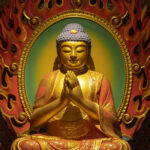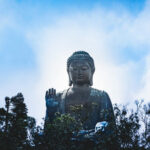Buddha Purnima is on May 5 this year (in India and Nepal) or May 19 (for those in Southeast Asian countries). The date varies because May has two full moon days, and the Buddhist and Hindu lunar calendars can be interpreted differently. Buddha’s birth is celebrated as part of a festival called ‘Vesak,’ which combines the three key events of his life — his birth, enlightenment, and death. Join us on a deep dive into the fascinating life of this profound spiritual leader.
History of Buddha Purnima
Buddha Purnima (also known as Buddha Jayanti) celebrates the birth of Prince Siddharta Gautama — a Nepali prince (circa 563-483 B.C.) who later went on to become known as the Buddha, the founder of Buddhism. The word ‘Purnima’ is Sanskrit for ‘full moon’, which explains why it is celebrated on a full moon day, and ‘Jayanti’ means ‘birthday’. The word Buddha is given to those who attain ‘bodhi’ or wisdom, hence the name was ascribed to Siddartha once he attained enlightenment. It is commonly celebrated during the month of ‘Vaisakhi’ in Hindu/Buddhist lunar calendars.However, Buddha’s followers never officially celebrated his birthday, though, for many centuries, festivals to honor Buddha were held. In fact, the celebration of Buddha Purnima was not formalized until modern times. It was only in May 1950, at the first conference of the World Fellowship of Buddhists in Colombo, Sri Lanka, that Buddha Purnima was officiated as a celebration during Vesak. It was agreed upon that the day of the full moon in May would be auspicious, due to Buddha attaining nirvana on a full moon day.The reason why Buddhism began to gain popularity was due to the teachings of non-violence, respect for life, and a more equal approach to the role of women — concepts that were very much in keeping with both tradition and modern ideas of progress. Thus, many countries around the world began to become primarily Buddhist nations, especially in Asia. Buddhism itself branched into sub-sects as each culture adapted and assimilated the main tenets. Today, Buddhism is practiced in different forms all over the world, and it is especially inclusive because it does not celebrate any deities (as other religions do). The philosophical bent of Buddhism gives it popularity across various groups of people.
Buddha Purnima timeline
Buddha is born as Prince Siddharta Gautama, in Lumbini, Nepal.
Buddha gains enlightenment under a tree, at Bodh Gaya (Bihar, India).
Buddha attains nirvana (release from the cycle of rebirth) and passes away in a state of deep meditation.
During the reign of King Ashoka, a patron of Buddhism, Buddhism begins to spread throughout Asia.
Buddha Purnima FAQs
Is the Buddha a god?
No, Buddha was a human who was considered to be extraordinary, but not a god. He was a seeker who found enlightenment by using morality, meditation, and wisdom, which is why many find his teaching applicable to their lives.
Is Buddhism gaining popularity around the world?
Strangely, Buddhism is predicted to see a decline, from 7% to 5% due to the relative infertility of Buddhist communities and people groups. There is no known correlation between the practice of Buddhism and a decline in fertility, however, our best guess is that it has something to do with Buddhist monks practicing celibacy!
What did the real Buddha look like?
Buddha is commonly depicted as a bald, chubby figure who is smiling; or a sage figure sitting cross-legged, with coiled hair and elongated earlobes. The real Buddha probably looked emaciated because of all the fasting he did, and some early carvings show an old man with a robe and topknot, sitting in a meditation position. The “laughing Buddha” commonly associated with Buddhism is actually a depiction of a legendary Chinese monk called Budai, who lived 1300 years after Buddha died.
How to Observe Buddha Purnima
-
Listen to Buddhist teachings
Buddhist teachings were originally passed on through word of mouth or stone carvings. Thanks to modern-day technology, we have access to the teachings of Buddha right at our fingertips. Listen to a TED Talk by the Dalai Lama, or any podcast on Buddhism. Or read a book.
-
Learn how to meditate
It is always a good idea to slow down and pause amidst the stresses of daily life. Mediation is fast becoming a common practice among diverse cultures. Attend a class, or try your own meditation routine — there is no one-size-fits-all. Just remember to relax!
-
Donate to an important cause
Since Buddha’s teachings are primarily about care and respect for living things, this is a great opportunity to find a cause you feel strongly about and donate to it. It could be anything from animal shelters to homes for the elderly, just as long as you can show that you care.
5 Different Ways Buddha Purnima Is Celebrated Across Asia
-
Avoiding meat
In India, pilgrimages are made to key places in Buddha’s life and Buddhists avoid eating meat.
-
China lights up
The Chinese celebrate by visiting pagodas and lighting incense, candles, and lanterns.
-
Japan celebrates with flowers
‘Hanamatsuri’ (Flower Festival) is where statues of Buddha are decorated with flowers and bathed with a special flower juice.
-
Free food in South Korea
South Koreans celebrate by giving out free food and lighting up lotus lanterns.
-
Thai devotees chant
Buddhists in Thailand gather in temples and chant prayers together.
Why Buddha Purnima Is Important
-
Known as a ‘thrice-blessed festival’
Buddha Purnima unites Buddhists all over the world for a common cause — to celebrate the three main events of the life of Buddha: his birth, enlightenment, and nirvana. It builds awareness of the teachings of Buddha in a way that respects all cultures.
-
Historical significance
Buddha Purnima commemorates the life of a historical figure whose teachings have changed the lives of millions. Whether Buddha is viewed as a spiritual or philosophical figure, there is no doubt about the impact his words have had on people for centuries, and continue to have.
-
It’s adaptable and evolving
Buddhism teaches us a way of life. You don’t have to be a follower of Buddha to appreciate the relevance of his teachings on wisdom, concentration, and discipline, even today. There is something there for everyone, all it requires is an open mind.
Buddha Purnima dates
| Year | Date | Day |
|---|---|---|
| 2022 | May 16 | Monday |
| 2023 | May 5 | Friday |
| 2024 | May 23 | Thursday |
| 2025 | May 11 | Sunday |
| 2026 | May 1 | Friday |

















